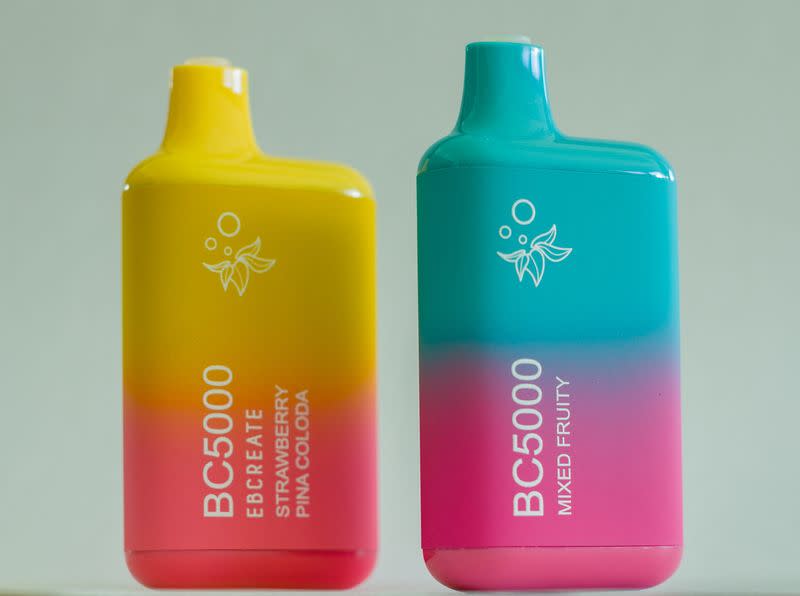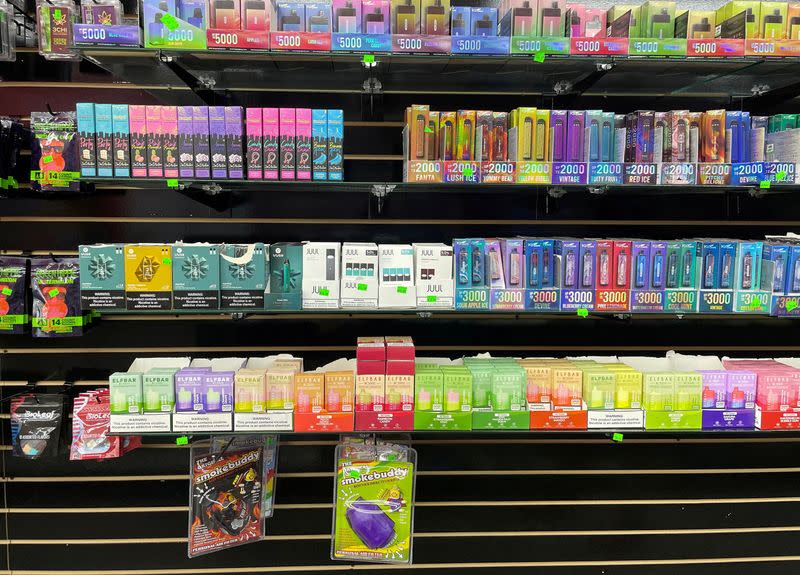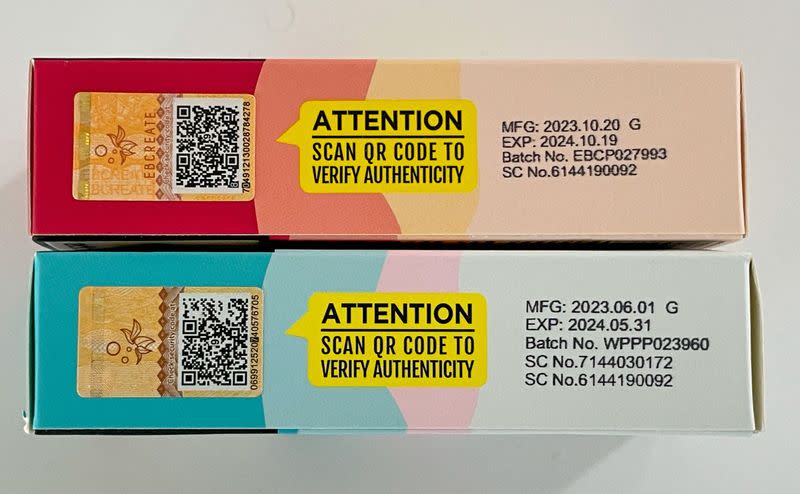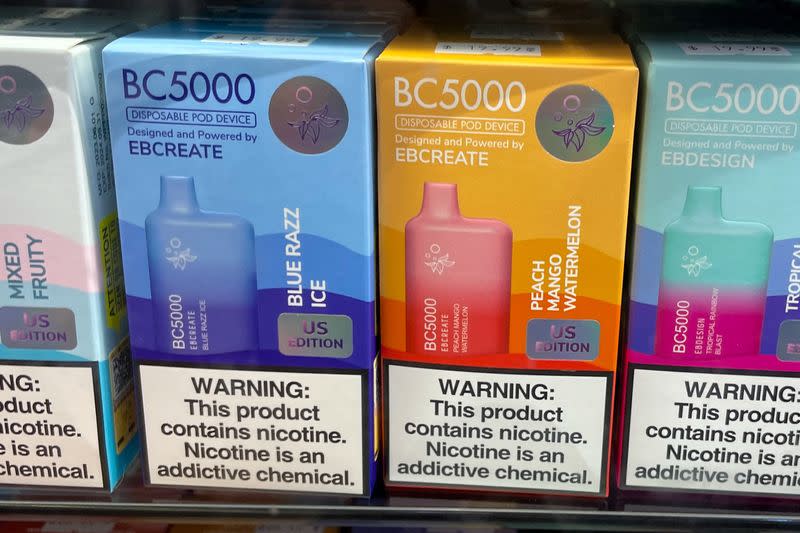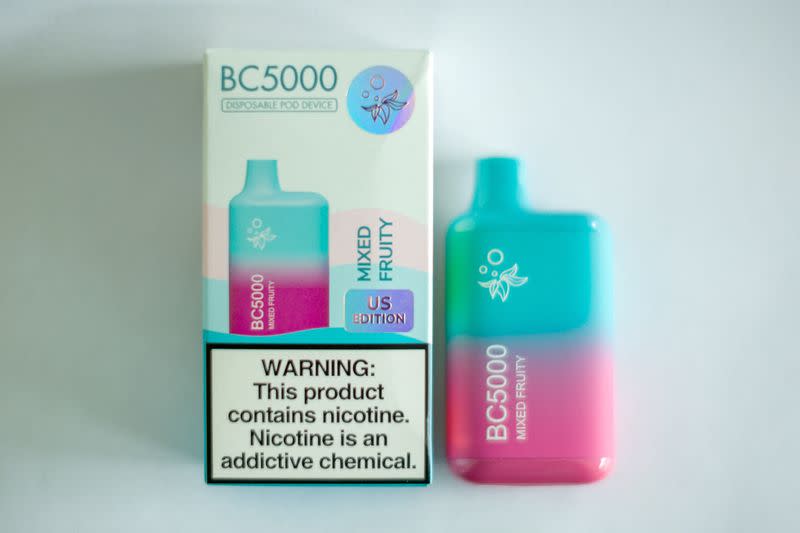Special Report-China e-cigarette titan behind 'Elf Bar' floods the U.S. with illegal vapes
By Chris Kirkham and David Kirton
SHENZHEN, China (Reuters) - A new breed of e-cigarette has addicted teenagers and confounded regulators worldwide by offering flavors like Blue Cotton Candy and Pink Lemonade in a cheap, disposable package.
The tycoon dominating this latest wave is Zhang Shengwei, 50, a veteran of China’s vape industry in the southern manufacturing hub of Shenzhen.
Most people have never heard of him. Zhang quietly rose over 15 years from a boutique exporter to become one of the world’s largest vape manufacturers. His main company, Heaven Gifts, now competes with industry giants Juul Labs Inc and British American Tobacco Plc in the United States, the United Kingdom and across Europe.
Zhang has navigated shifting regulations in countries cracking down on candy-flavored vapes, which many health advocates say are designed to hook teenagers. In the United States, the firm simply ignored regulations on new products and capitalized on poor enforcement. It has flooded the U.S. market with flavored vapes that have been among the best-selling U.S. brands, including Elf Bar, EBDesign and Lost Mary. In the United Kingdom, by contrast, Zhang has complied with regulations requiring lower nicotine levels and government registration while building an unmatched distribution network — and driving a surge in youth vaping.
In China — where more than 90% of the world’s vaping devices are manufactured — Zhang steered clear of domestic sales, resisting the temptation of a gargantuan market with 300 million smokers who might be converted to vaping. His focus on exports looked prescient when Beijing last year banned all domestic sales of flavored vapes, crushing some of Zhang’s competitors that had bet heavily on the China market.
Zhang, who also does business under the corporate name Shenzhen IMiracle Technology, declined requests for an interview. A Heaven Gifts spokesperson, Jacques Li, said the company does not market to children and takes youth-vaping concerns seriously. He acknowledged the company’s flavors could attract teens but said the company is modifying its packaging to be less appealing to youth and discontinuing some flavors, such as “rainbow candy.”
Flavored vapes are more effective in helping smokers quit than those that mimic cigarettes, he said.
“Adults like flavors, too,” Li said. “Flavored e-cigarettes shouldn’t be demonized. They’re not evil.”
Zhang’s deft maneuvering illustrates the difficulty of curtailing youth vaping despite a global effort to halt a new wave of teenage nicotine addiction. It also highlights how China’s domestic candy-vape crackdown is proving to be a rare success — even as its homegrown e-cigarette industry continues to dominate manufacturing and exports.
China’s enforcement wins owe to its communist government’s greater power over companies and willingness to levy stiff penalties. Chinese state media has trumpeted crackdowns including a March raid on a nationwide distribution network, in which authorities seized e-cigarette inventory valued at 150 million yuan ($21 million USD) and arrested 10 people. Sales of vapes, now permitted only in unpopular tobacco flavors, plummeted from $2.9 billion in 2021 to $1.7 billion in China last year, according to market research firm Euromonitor International. Sales are predicted to fall much further this year.
In banning flavors, China cites the same health concerns with youth vaping as other governments. But Beijing has a unique conflict of interest in the crackdown: It also runs a state cigarette monopoly, which accounts for 8.7% of China’s tax revenue and directly benefits from strict e-cigarette regulation. China National Tobacco Corp, according to Euromonitor, last year sold more than 2.4 trillion cigarettes, nearly four times as many as U.S.-based tobacco giant Philip Morris International reported selling last year.
“Everything about the regulations is about protecting cigarettes,” said Geoff Fong, founder of the International Tobacco Control Policy Evaluation Project at Canada’s University of Waterloo, which evaluates the impact of tobacco regulation across 31 countries.
China National Tobacco and the State Tobacco Monopoly Administration, which regulates cigarettes and e-cigarettes, did not comment.
As China cracks down on e-cigarettes at home, it continues to help vape manufacturers including Heaven Gifts export millions of candy-flavored vapes. With the domestic flavor ban, China also levied new taxes on e-cigarette manufacturers, importers and domestic distributors. But those taxes don’t apply to e-cigarette manufacturers targeting overseas markets. Authorities also smoothed the way last year for overseas shipping by “white-listing” Heaven Gifts and many other Chinese vaping companies at Shenzhen’s airport, requiring fewer export inspections, according to Heaven Gifts and a post last year from China’s e-cigarette association.
In the wake of China’s domestic flavored-vape ban, the value of the nation’s exports of e-cigarettes and related products jumped 29.9% to $5.48 billion in the first half of 2023 from the same period a year earlier, according to data from China’s General Administration of Customs.
The U.S. Food and Drug Administration (FDA), by contrast, has had little success curtailing flavored e-cigarettes under restrictions implemented since 2020 amid public outrage over youth vaping. Heaven Gifts and many other China-based manufacturers are selling millions of vapes in the United States without getting FDA authorization for their products, which is required of any foreign or domestic e-cigarette purveyor.
By moving forward with illegal sales, the Chinese firms are grabbing market share from companies trying to comply with the FDA’s lengthy and expensive approval requirements. The FDA requires extensive studies to prove any vaping product is a net benefit to public health by helping adults quit smoking without addicting new users to nicotine.
Brian King, who heads FDA’s Center for Tobacco Products, which regulates e-cigarettes, said in an interview the agency can’t levy penalties or file lawsuits against foreign companies. The FDA, he said, also lacks enough enforcement resources to stem the tide of cheap Chinese vapes once they reach U.S. shores. Asked what he knows about Zhang, King declined to comment on any individual or company but said the agency is “obviously aware of the Elf Bar product.”
In a statement, British American Tobacco called on the FDA and law enforcement to crack down on illegal products from Heaven Gifts and others that have “overrun” the U.S. market. These manufacturers, it said, are “flagrantly violating virtually every rule and guidance FDA has issued. These products continue to pour across our borders and target youth.”
Juul said in a statement that “inadequate enforcement” against illicit disposable products “undermines FDA’s ability to oversee a properly regulated marketplace.”
Company spokesman Li said Heaven Gifts is “trying our best to stay compliant in the U.S.” but did not answer questions about whether the company had filed required FDA applications. He called the FDA rules incoherent and unclear as to “what standards you have to meet,” without citing specifics.
The FDA had no comment on Li’s critique.
U.S. youth vaping rates have dropped significantly since the coronavirus pandemic. But Elf Bar has quickly grown into the most popular product among teens. A June study released by the U.S. Centers for Disease Control and Prevention (CDC) found that Elf Bar was the number one U.S. disposable e-cigarette brand in December 2022, about a year after it went on sale. A separate national survey of youth tobacco use released last month by the CDC and FDA found Elf Bar was the brand of choice for 56.7% of middle- and high-school vapers.
Matthew Myers, who recently retired as president of advocacy group Campaign for Tobacco-Free Kids, said the government’s failure to enforce the law is allowing companies like Heaven Gifts to make "massive profits," while putting "anybody who tries to do the right thing” at a disadvantage.
The open sale of products without FDA authorization “is about the most blatant thing that I’ve seen,” said Myers, who worked for four decades as a tobacco regulator and anti-smoking advocate. “What you’ve got is a guy who’s thumbing his nose at the United States government.”
Li said in a statement Tuesday that the company was “working with regulators in the U.S. to solve the issue,” without elaborating on those communications. The FDA did not immediately comment on whether it has interacted with the company.
WINNERS AND LOSERS
Zhang’s meteoric rise has left a trail of damaged competitors who responded differently to the global regulation wave.
Beijing-based RLX Technology, founded in 2018, made the opposite moves: Betting big on the Chinese market and complying with new U.S. regulations.
The company was valued at nearly $35 billion in a January 2021 initial public offering on the New York Stock Exchange. Now, after the Beijing ban, it’s worth $3.3 billion.
In the United States, RLX has been mired in regulatory approval processes. It has spent millions on extensive FDA-required studies since 2020 but still awaits an agency decision. RLX declined to comment for this report.
Heaven Gifts and others have thrived by disregarding U.S. regulations. Zhang’s fruity vapes racked up more than $650 million in U.S. sales over the year ending in mid-October 2023, according to private retail data from Circana, a Chicago market research firm formerly known as IRI. The data, which measures purchases from January 2018 through mid-October of this year, was shared with Reuters by a person outside Circana who asked not to be identified.
Heaven Gifts sales for the year ending September 2023 represent more than 9% of the U.S. e-cigarette market, according to the data. That put Zhang’s disposable brands behind only the Vuse Alto, made by British American Tobacco, and Juul, in market share.
In May, more than a year after Heaven Gifts started flooding U.S. stores, the FDA took aim at Elf Bar by sending alerts to customs officials instructing them to stop shipments of the company’s products. Li said that none of the company’s shipments have been “seized or sent back.”
A Reuters review of a FDA database listing shipments blocked at the ports showed that FDA and customs officials, on November 6, stopped an unspecified amount of products from a Zhang company from entering the United States. FDA and customs officials did not comment about the detained products.
Li said the firm has stopped shipping e-cigarettes under the Elf Bar and EBDesign brands, which were named in the May import alert. Li did not address whether the company has halted shipments under other product names, such as Lost Mary. He said “we don’t think we are still a leading brand” in the United States, and the company believes counterfeit versions of its products are “rampant.”
The FDA said it is still assessing information on detained imports but that such data can’t capture the “true impact” of its alerts. The agency said it believes the alerts likely cause “countless firms” to voluntarily stop importing illegal e-cigarettes.
Five current and former executives in the Chinese vaping industry told Reuters that Heaven Gifts’ flouting of FDA rules follows a common playbook across China’s e-cigarette industry. Following the rules, they said, costs companies millions of dollars in compliance expenses and lost profits while competitors enter the U.S. market illegally with little or no consequences.
Elf Bar and other Heaven Gifts brands remained the market leader in disposable e-cigarettes in the quarter ending in September, according to the Circana data.
The FDA’s King said the agency acted on Elf Bar once it had data showing that the product was a top seller and popular among youth. He said it takes time to build enforcement cases against U.S. based suppliers or retailers selling illegal vapes.
“We can't be everywhere at every time,” King said. “So I've got to prioritize the resources we do have.”
The agency has relatively little money to pursue e-cigarette companies, King said, because it does not assess fees on the industry for that purpose. It’s now seeking the authority from Congress to do so. Enforcement is also slowed by the need to consult with the U.S. Justice Department before suing violators, King said, and an agency practice of sending distributors and retailers warnings before taking action.
After sending warning letters beginning in June to more than 300 retailers selling Elf Bar, the agency has since fined more than 60 businesses, many of them gas stations and convenience stores.
MEET ‘WAYNE’
Disposable vapes such as the Elf Bar typically contain much higher volumes of nicotine liquid than earlier versions of e-cigarettes, including those from Juul. And they’re easier to use: Just open the box and start puffing.
Before the 2020 U.S. rules, Juul dominated the U.S. vaping market with a device using “pods” of nicotine liquid in an array of flavors that were a hit with teenagers, making the company the prime target of public outrage.
A Juul pod has about 200 puffs; some Heaven Gifts vapes offer up to 5,000 drags. A Juul starter kit costs at least $40 for a charger, device and pack of four pods. Zhang’s devices commonly sell for about $20.
Juul pulled popular flavors such as Mango ahead of the 2020 FDA restrictions, which prohibited flavors in pod-based devices. Heaven Gifts has offered Lemon Drop, Strawberry Piña Colada and Tropical Rainbow Blast, among many others.
Sales of disposable vapes including the Elf Bar have exploded because users consider them a good value, said Becky Freeman, an associate public-health professor at the University of Sydney in Australia, which has also seen a sharp rise in unauthorized e-cigarettes, many from China, and youth use.
“If you’re a group of kids, you pitch in some money, and you share it,” Freeman said. “It’s the right product, the right price, and you can get it in all these flavors.”
Five years ago, Heaven Gifts made no products of its own, operating as an exporter and distributor of other Chinese-made vaping products, such as the Suorin and Smok brands. Zhang originally exported vaping products made by the Chinese company Ruyan, which is credited with inventing the modern e-cigarette.
In the industry’s early days, in the late 2000s, Zhang was widely known as “Wayne” on online vaping forums. He started the company in a Shanghai apartment with five other staffers, said company spokesperson Li. Zhang used the bathroom as his office, he said. Heaven Gifts was founded in 2007, Li said. The name evoked the notion that vaping offers a miracle cure for the afflictions of tobacco cigarettes.
Trading companies like Zhang’s targeted mom-and-pop vape stores and regional distributors who couldn’t afford to buy the large minimum orders demanded by manufacturers in Shenzhen’s “Vape Valley.”
Heaven Gifts moved from Shanghai to Shenzhen in 2014 in a bid to make its own product. Early efforts failed, said Oliver Kershaw, founder of e-cigarette-forum.com, a popular hub for industry players and vaping enthusiasts. But Heaven Gifts excelled in cultivating ties with distributors, particularly in the UK.
In 2019, still determined to manufacture his own e-cigarettes, Zhang started investing heavily across the production chain. Heaven Gifts took a 14.6% stake in manufacturer Shenzhen Youme Technology, the maker of Suorin vaping products, according to Chinese corporate data website Tianyancha. Shenzhen Youme did not comment.
Zhang also invested in makers of batteries, heating chips, nicotine liquid, and a highly automated vape factory in the nearby city of Zhuhai. Li said such investments were “very important” strategic moves for Heaven Gifts.
Li said the company launched the Elf Bar first in the UK, in 2021, and later that year in the United States. Heaven Gifts has grown from 200 staff around a year ago to more than 700 today, Li said. At a time when many Chinese graduates struggle to find jobs, the company presents itself as friendly and international, with promotional videos showing 20-something staffers fistbumping and clinking bubbleteas in a bright modern space.
Two people who work with Zhang describe him as low key. He dresses simply, despite his newfound riches, in jeans and collared shirts. He’s a hands-on manager with sales, research and strategy teams but keeps relatively quiet in meetings.
He still goes by Wayne, Li said.
SPARKING A UK YOUTH-VAPING BOOM
Before launching the Elf Bar, Heaven Gifts established a distribution beachhead in the UK. While operating as a middleman, moving products from China’s Vape Valley through local distributors, Zhang also set up his own branded website called Deepvaping to sell directly to consumers and retailers.
The UK offered a more permissive regulatory environment. As the United States debated banning flavors, the UK allowed them, while setting limits on nicotine levels and requiring vape companies to register with regulators. Heaven Gifts says it abided by the UK rules.
U.S. youth vaping surged with the rise of Juul in 2018 and 2019, but it was more controlled in the UK until the introduction of the Elf Bar and similar flavored disposables. Then it jumped: A survey released in June by Action on Smoking and Health (ASH), a British public-health organization, found that more than 20% of children aged 11 to 17 had tried vaping by 2023, up from about 14% in 2020. The increase, the survey found, was driven overwhelmingly by disposables, the Elf Bar being the most popular.
Hazel Cheeseman, deputy chief executive of ASH, said disposable-vape manufacturers such as Heaven Gifts “have not been taking remotely seriously that their products are so appealing and so widely used by under-18s.”
The UK and the European Union both have regulations restricting nicotine levels, which means the amount of nicotine in a European Elf Bar isn’t enough to satisfy most cigarette smokers trying to quit, said Kershaw, the e-cigarette-forum.com founder. But it’s enough to lure nonsmokers and potentially addict them.
In July, consumer-products and vaping wholesaler Supreme Plc announced a deal to supply Elf Bar and Lost Mary to several major British supermarket and convenience store chains. Supreme says on its Elf Bar product webpage that about 2.5 million of them are sold weekly in the UK. Supreme did not answer questions about public-health advocates’ concerns with the products, but said the company expects to generate 40 million pounds ($50.4 million USD) in revenue from the products for the year ending in March 2024.
Elf Bar and other flavored e-cigarettes are illegal in some parts of Europe, including Hungary, where local laws are more restrictive than EU tobacco regulations.
Hungary has battled a surge of illegal disposable vapes for more than a year, according to Tibor Demjen, who leads Hungary’s anti-tobacco efforts. The government has slowed sales but not stopped them, he said. He accused the disposable purveyors of trying to “infiltrate the young population with nicotine.”
“It’s their job,” Demjen said, “and they do it well.”
Heaven Gifts spokesperson Li said the company is “paying great attention” to the issue and blamed illegal smuggling of products meant for other markets into Hungary.
BOTCHED CRACKDOWN
When the U.S. FDA tightened e-cigarette rules in 2020, it made what public health groups would call a monumental blunder that supercharged production of disposables in flavors appealing to teenagers.
In the year before the implementation of those rules, Juul dominated the market with its flavored pods, the favorite among teens. The FDA outlawed sweet flavors in pod-based devices — but exempted other device types, including disposables. The agency said it didn’t want to restrict options for adults who might use other kinds of e-cigarettes to quit smoking. All companies would still need FDA authorization to sell specific products.
The result: The industry shifted en masse toward producing candy-flavored disposables for the U.S. market.
Juul pulled all flavors except tobacco and menthol by late 2019, ahead of the FDA’s 2020 flavor restrictions. The firm’s market share, according to the Circana retail data, fell from a peak of 71% in the fourth quarter of 2018 to 21% in the third quarter of 2023. Flavored disposable brands like those made by Heaven Gifts climbed from 4% of the market to 43% over the same period, the data show.
Mitch Zeller, who retired as the head of FDA’s tobacco division last year, told Reuters that he was informed in December 2019 by FDA’s chief of staff, Keagan Lenihan, that the White House wanted flavor restrictions only on pod-style e-cigarettes. In September of that year, then-President Donald Trump had announced plans to ban all e-cigarette flavors except tobacco because of their popularity among teenagers, a move that sparked blowback from the industry and adult vapers.
Zeller said he told Lenihan teenagers would just switch to flavored disposables, and that the FDA needed to push back on the White House. “I was hugely concerned that this policy was drawing a line in the wrong place,” said Zeller, who now advises a pharmaceutical company developing smoking-cessation drugs.
Lenihan said the White House’s decision was final, according to Zeller. Lenihan, who now works as an external-affairs executive for Philip Morris International, did not comment. A Trump spokesperson also had no comment.
In a statement to Reuters, the FDA said data in 2020 showed teens “overwhelmingly preferred” cartridge e-cigarettes like Juul, and that the agency “has the ability to shift enforcement priorities based on new data and information.”
The bigger problem for the FDA: Its approval process is considered so onerous that many e-cigarette manufacturers just skip it, even though sweet flavors remain potentially legal in disposable vapes.
On paper, U.S. e-cigarette regulations are far stricter than those in Europe and the UK, requiring companies to prove a net benefit to public health. To date, the agency has only granted authorizations to 23 vaping products, all of them tobacco-flavored.
Yet those 23 products combined represented less than 3% of e-cigarette sales in the United States from July through September, according to the Circana data. In all, the data show more than 3,000 new vaping products have been introduced to the United States market over the past year.
Heaven Gifts launched the Elf Bar in the United States in late 2021 without getting FDA authorization to sell. Sales skyrocketed. Zhang saw weekly sales of Elf Bar and his other U.S. brands grow from less than $100,000 a week in early February 2022 to more than $9 million a week in early October 2023, according to data produced by Circana. Heaven Gifts products rang up about triple the sales of all the FDA-authorized products combined from July through September, the data show.
After launching U.S. sales, Zhang quickly built out his distribution network and then introduced new brands alongside the Elf Bar. When the agency issued import alerts in May, seeking to block Heaven Gifts shipments, it included some brands but omitted others, including Lost Mary and Funky Republic.
Lost Mary sales jumped from less than $100,000 a week in September 2022 to more than $3 million for the first week of October, putting it among the top 10 U.S. disposable vapes, the data show.
Li said Heaven Gifts regularly adds new brands to diversify its product portfolio.
“Staying ahead of regulators, honestly, is not on our agenda,” he said in a statement. “We must work with regulators instead of tiptoeing around them.”
The FDA faces a complex challenge in stopping the illegal vape import surge but has been “unacceptably slow” in responding, said Kurt Ribisl, a public-health professor at the University of North Carolina at Chapel Hill.
“It’s kind of a cat-and-mouse game,” he said, “but the FDA is a slow-motion cat.”
(Reporting by Chris Kirkham in Los Angeles and David Kirton in Shenzhen, China; editing by Vanessa O'Connell and Brian Thevenot)
